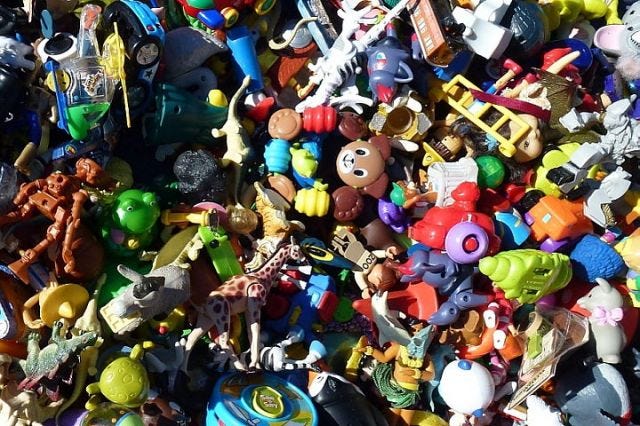So What, Who Cares (vol 1, issue 62) How clutter affects family life
Hello! If you participated in Green Monday today, please let me know via email or Twitter -- I am dying to find out exactly how much traction The Eight Days Of Retail have in real-life budgets.
*
Household clutter is an exacerbating factor in unhappy homes. So says a new study from the University of North Carolina's Frank Porter Graham Child Development Institute. According to the report on NPR:
[R]esearchers found that children who experienced chaos at home — including high levels of noise, excessive crowding, clutter and lack of structure — were more likely to draw themselves at a distance from their parents or much smaller in size relative to other figures.
In some cases, these kids drew themselves with drooping arms and indifferent or sad faces.

This study examined children who were six years old -- still right in the middle of the period where the brain is ramping up its ability to develop and implement executive function skills. Those skills: planning, categorization of things or ideas, organization, and sustained attention. In terms of executive function, it rests in the prefrontal cortex, which doesn't finish developing until the late teens, so it's on parents to help fill until the kid's prefontal cortex is robust enough to tell her caveman brain (i.e. the limbic system) to sit still and pay attention.
(In the "O, irony" category, at least one study points out that children themselves are a source of clutter: a household's inventory of material objects swells 30% with the addition of a child, for each child.)
So what? Clutter is stressful, period: Princeton researchers found that physical clutter in a work environment hampers work performance; UCLA researchers found that mothers' stress hormones spike when they have to deal with household cruft. In turn, that stress can goose our amygdala (more on the amygdala in Vol 1, issue 13) and in doing so, hamper our ability to solve problems. A household with clutter is going to stress out the grown-ups, stress out the kids, and impact their ability to have a healthy relationship.
Who cares? It's worth noting that this study is done as part of a long-term study on the development of children growing up in poverty, and the researchers have noted that the crowding, noise, and clutter are "a function of poverty." There are several ways in which poor kids are often at a developmental disadvantage relative to their peers. This is just one more.
Extra reading: Life At Home in the Twenty-First Century: Thirty-Two Families Open Their Doors provides a stark visual catalog of the differences in American households based on income level, education and other demographic markers. It's worth flipping through to see what the insides of people's houses really look like -- something worth doing if you have a bit of a interior design blog problem (cough, cough).
Also worth reading for more insight into the relationship between our mental state and our material world: Randy Frost and Gail Sketekee's Stuff: Compulsive Hoarding and the Meaning of Things. It's a humane look at how things like hoarding happen, and what sort of feelings compel us to live in clutter and chaos. Come for the case studies, stay for the tour into western thought, including a detour into psychoanalyst Erich Fromm's theory on two contrasting state of existence -- having and being. We are still learning now how one shapes the other.
*
Your holiday pop culture note of the day: I love listening to holiday music in December, but I think I might enjoy complaining about Christmas music just a little more. If you're of like mind, this vintage Gawker piece on the ten most annoying Christmas songs is for you. It's like Brian Moylan is inside my brain when he writes:
This song is like your ex-boyfriend who finally stopped calling, but still tries to Facebook stalk you when he gets drunk or depressed. Also I feel like George Michael is disingenuous when singing this. He might as well be saying, "Last Christmas I was in a popular singing duo. The very next day, I threw you away and started a solo career and never thought about you again. But this year, to give you some cheer, at least you'll get a royalty check, Andrew Ridgeley."
In that same vein, Alternet's broadside against pop holiday music is both splenetic and hilarious. It starts off with a classic riff on how commercial Christmas music has become, then alerts us all to the horrors of Adam Levine singing "Happy Christmas/ war is over." (They are wrong about the Pogues' "Fairytale of New York.")
What do you nominate as the most annoying Christmas songs, either classic or pop? Let the hate flow through you and share it via email or Twitter.
*
Did you miss an issue of So What, Who Cares? The archive is here.
Also, there is now a topic index that tells you what was in each issue. If you're like, "When did she send out a picture of Brandon Routh snuggling a kitty cat?" -- well, now you can find it. (It was November 11, 2014, btw.)
As always, I welcome your feedback and suggestions via email or Twitter. Always let me know what you think about So What, Who Cares? If you really like it, tell a friend to subscribe.


